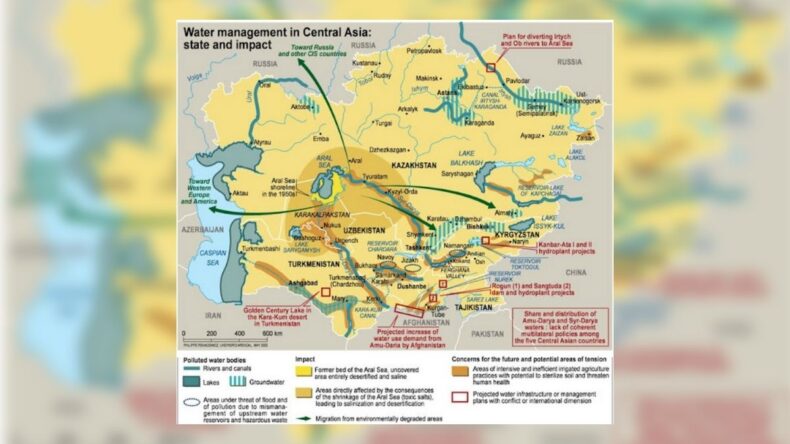In August, the Central Asian Committee and the heads of the state held a meeting that addressed the current prevailing issues such as the Covid 19 Pandemic and the Taliban taking control of Afghanistan.
Besides these mentioned issues, an additional proposal by President Kassym Jomart Tokayev ensured the creation of a working group to promote regional cooperation and conserve water resources.
Major issues faced by Central Asia
Central Asia has been facing a water crisis for a very long and has become a catalyst for conflict.
There are many situations and issues witnessed by Central Asia, ranging from their complicated relationship with the Soviet Union, which led them to face widespread desertification and an impactful hit to the water flow of the Aral Sea due to the construction of dams and irrigation projects.
Water wars between upstream nations such as Kyrgyzstan and Tajikistan and downstream nations such as Kazakhstan, Turkmenistan and Uzbekistan frequently occur.
A clash occurred between Kyrgyzstan and Tajikistan over the water intake station on the Kyrgyz- Tajik border, near the Kok Tash in the Batken province.
Unfortunately, Central Asia does not have unified water protection and conservation policies that solve the ongoing problem.
What makes the situation in Central Asia far worse is climate change which involves the worst summers leading to severe droughts.
Central Asia and its relation with Kazakhstan
Kazakhstan has been emphasizing environment conservation and protection of the ecosystem to promote and support eco-tourism.
President Tokayev has plans to rely on technological ventures by digitizing 119 waterways up to a distance of around 3000km to save up to two billion cubic meters of water.
During the 6th August summit, President Tokayev introduces a particular working group of Central Asian Vice Ministers to discuss and tackle the water issue.
The primary objective is to discuss and develop solutions that can be mutually beneficial by taking into account the needs and requirements of all the sectors of the economy.
The official members in the Committee also suggested the formulation of an International Water and Energy Consortium in Central Asia, stating that this consortium would be coordinating the interests of all the countries in the field of hydropower, irrigation and ecology.
The Committee has given suggestions to improve the framework and the organizational structure of the International Fund for Saving the Aral Sea.
The Fund mentioned above has numerous objectives to fulfil, such as providing finance and credit joint practical measures, programs and projects for saving the Aral Sea and ecological rehabilitation of the Aral Basin.
President Tokayev also agreed to utilize the use of water and energy resources of the Syndarya River, which was adopted in 1998.
Will these water resource projects be a benefit for Central Asia?
It is evident that besides these water resource projects, there are other pivotal issues, such as the Taliban control over Afghanistan and how it affects the ongoing regional security and the Covid 19 pandemic.
Looking at the depleting climatic change, it is commendable that President Tokayev has introduced numerous initiatives to solve the water issues.
Sharing water resources among the five states may have other consequences. Kazakhstan’s Lake Balkhash may be the following Aral Sea because the Ili River, which flows from China, supports irrigation projects in the Chinese Territory.
Water conservation is a sensitive issue that should be looked upon in detail because the situation with time will cause more problems due to the adverse climate change.
The proposals introduced by President Tokayev are essential and relevant as they are innovative policy suggestions that can achieve great results. Water should not be dividing Central Asian governments.
Still, it should be uniting them so that the Committee can figure out methods to distribute water equally for the citizen’s benefit.













